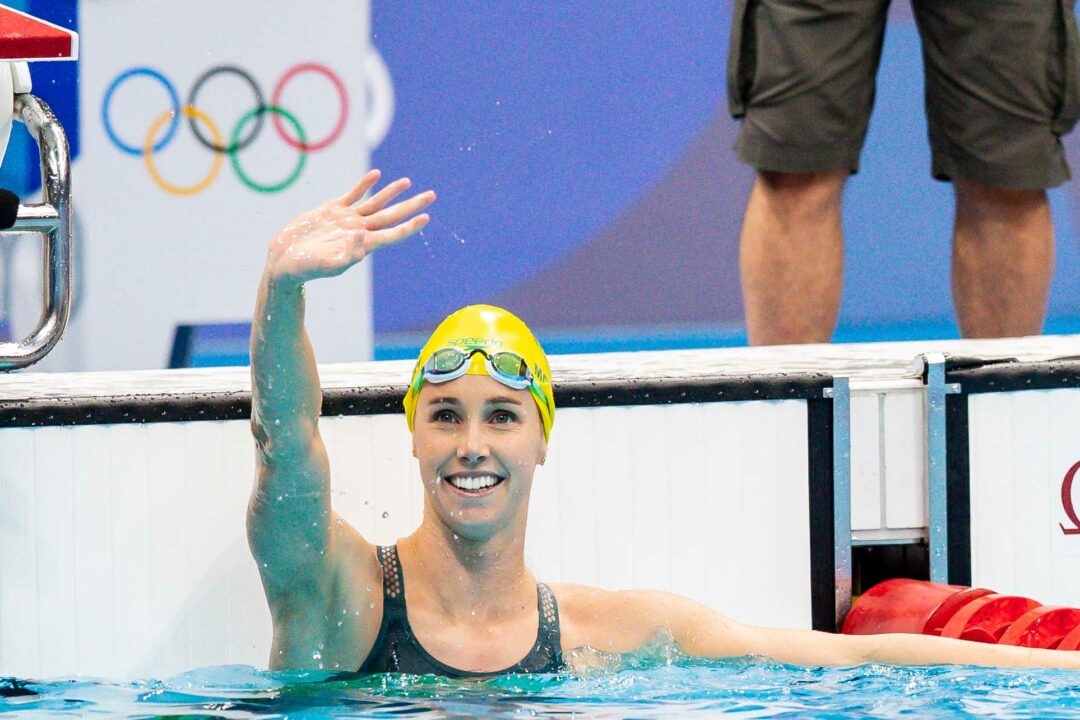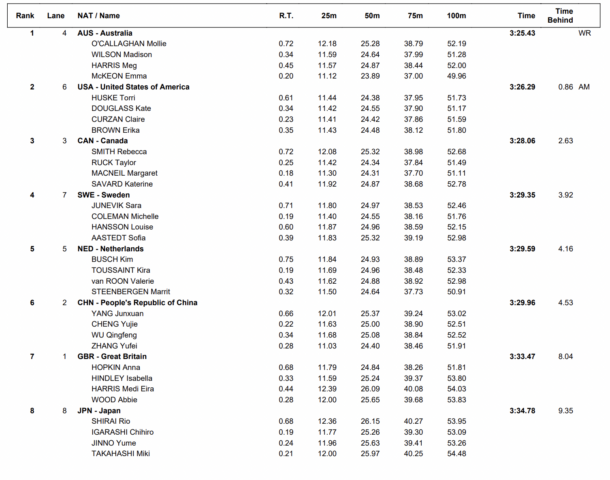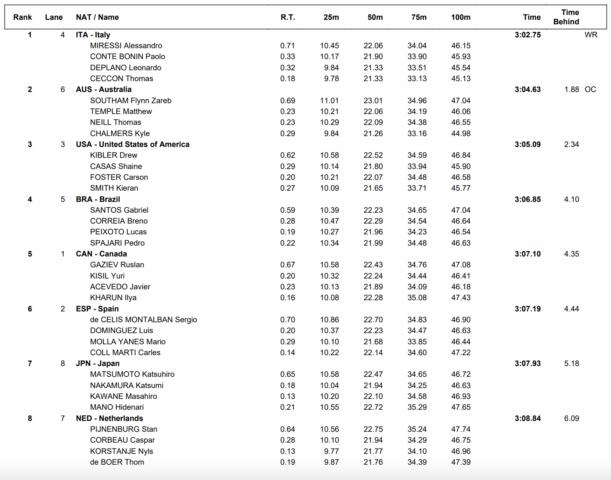2022 FINA SHORT COURSE WORLD CHAMPIONSHIPS
- Tuesday, December 13 to Sunday, December 18, 2022
- Melbourne Sports and Aquatics Centre, Melbourne, Australia
- SCM (25m)
- Prize Money
- Meet Site
- Meet Schedule
- How To Watch
- Meet Roster Index
- Psych Sheets (Updated)
- Live Results
The relays have gotten off to a blistering start at the 2022 Short Course World Championships in Melbourne, with world records in both the men’s and women’s 400 freestyle relays falling by the wayside on Day 1.
The Aussie quartet of Mollie O’Callaghan, Madi Wilson, Meg Harris and Emma McKeon combined to knock more than a second off the previous women’s record in a time of 3:25.43, while the Italian team of Alessandro Miressi, Paolo Conte Bonin, Leonardo Deplano and Thomas Ceccon cracked the men’s mark in 3:02.75.
In addition to the quick splits produced from these two record-breaking squads, there were a number of other blazing-fast legs in the race. Let’s dive into the splits below:
WOMEN’S 400 FREESTYLE RELAY
Lead-off Splits
| Swimmer | Country | Split |
| Torri Huske | USA | 51.73 |
| Anna Hopkin | GBR | 51.81 |
| Mollie O’Callaghan | AUS | 52.19 |
| Sara Junevik | SWE | 52.46 |
| Rebecca Smith | CAN | 52.68 |
| Yang Junxuan | CHN | 53.02 |
| Kim Busch | NED | 53.37 |
| Rio Shirai | JPN | 53.95 |
Torri Huske has clearly carried her strong early season form in the NCAA over into this competition, leading off the Americans in a time of 51.73 to mark a new personal by two-tenths of a second. Huske went 51.93 last year in Abu Dhabi, placing sixth in the final of the 100 freestyle, less than three-tenths shy of a medal.
Anna Hopkin‘s 51.81 lead-off for Great Britain is also a personal best, dipping under 51.90 from December 2019, and indicates she’ll be one to watch the rest of the week.
O’Callaghan’s split of 52.19 is solid for the Aussies, but many would have expected her to beat Huske and Hopkin here. She notably didn’t enter any individual freestyle events.
Sweden’s Sara Junevik has had an incredible start to this meet, first clocking a PB of 52.79 on the prelim relay before re-lowering it here in 52.46.
Flying Splits
| Swimmer | Country | Split |
| Emma McKeon | AUS | 49.96 |
| Marrit Steenbergen | NED | 50.91 |
| Maggie MacNeil | CAN | 51.11 |
| Kate Douglass | USA | 51.17 |
| Madi Wilson | AUS | 51.28 |
| Taylor Ruck | CAN | 51.49 |
| Claire Curzan | USA | 51.59 |
| Michelle Coleman | SWE | 51.76 |
| Erika Brown | USA | 51.80 |
| Zhang Yufei | CHN | 51.91 |
| Meg Harris | AUS | 52.00 |
| Louise Hansson | SWE | 52.15 |
| Kira Toussaint | NED | 52.33 |
| Cheng Yujie | CHN | 52.51 |
| Wu Qingfeng | CHN | 52.52 |
| Katerine Savard | CAN | 52.78 |
| Sofia Aastedt | SWE | 52.98 |
| Valerie Van Roon | NED | 52.98 |
| Chihiro Igarashi | JPN | 53.09 |
| Yume Jinno | JPN | 53.26 |
| Isabella Hindley | GBR | 53.80 |
| Abbie Wood | GBR | 53.83 |
| Medi Garris | GBR | 54.03 |
| Miki Takahashi | JPN | 54.48 |
All indications are that Emma McKeon‘s otherworldly 49.96 split is the fastest in history, overtaking fellow Aussie Cate Campbell‘s 50.38 from an ISL match in 2019.
McKeon opted out of the LC World Championships this year and then was solid at the Commonwealth Games, but appears to be back on the same form that led her to a record-breaking medal haul at the Tokyo Olympic Games.
The Netherlands’ Marrit Steenbergen has had a phenomenal back half of the year, including winning four gold medals at the European Championships in August, and continues to perform well as her 50.91 split is significantly faster than her career-best from Abu Dhabi (51.76 – she also went 51.72 in the prelims).
For Maggie MacNeil, 51.1 is a massive improvement in her freestyle over the last 12 months, having had her fastest split come at the 2021 World Championships at 52.07. The Canadian did swim a personal best of 51.82 from a flat start at the Toronto World Cup, so it’s clear she’s found a new gear.
Kate Douglass has been sensational in the NCAA this year, but similar to MacNeil, her 51.1 split shows a big leap forward after leading off the 2021 team in 52.39. The same goes for Claire Curzan, who splits 51-mid after going 52.2 last year.
Madi Wilson is incredibly consistent in SCM so it’s no surprise to see her in the 51-low range, while Taylor Ruck at 51.49 is a positive sign for the Canadian relays the rest of the week.
Zhang Yufei looks strong for China, splitting sub-52 after she was 52.32 on last year’s relay.
No one jumps off the page as being particularly ‘off’ when looking at these splits, though Abbie Wood‘s 53.8 is a bit concerning considering she’s been as fast as 52.38 on a relay (Oct. 2020).
MEN’S 400 FREESTYLE RELAY
Lead-off Splits
| Swimmer | Country | Split |
| Alessandro Miressi | ITA | 46.15 |
| Katsuhiro Matsumoto | JPN | 46.72 |
| Drew Kibler | USA | 46.84 |
| Sergio de Celis Montalban | ESP | 46.90 |
| Flynn Southam | AUS | 47.04 |
| Gabriel Santos | BRA | 47.04 |
| Ruslan Gaziev | CAN | 47.08 |
| Stan Pijnenburg | NED | 47.74 |
Alessandro Miressi was the class of the field on the lead-off, touching in 46.15 after going 46.08 in the prelims.
Miressi won the individual 100 free title last year in 45.57 after leading off the relay in 46.12, so he’s essentially had the exact same start to the meet this time around (though significantly faster on the prelim relay).
The field was pretty bunched up behind the Italian, with Drew Kibler essentially on par with his personal best time from the World Cup (46.82) and Spain’s Sergio de Celis Montalban knocking his best time done nearly half a second in 46.90.
Kibler was notably a tad off his prelim performance, where he split 45.91 with a takeover (0.25 reaction).
The lone swimmer who was a bit behind the pack was Dutchman Stan Pijnenburg, who was well off his best time of 46.38 in 47.74. Pijnenburg led off the Dutch relay in 46.64 in 2021, and the early deficit was too much for the team to overcome as they ended up in eighth.
Flying Splits
| Swimmer | Country | Split |
| Kyle Chalmers | AUS | 44.98 |
| Thomas Ceccon | ITA | 45.13 |
| Leonardo Deplano | ITA | 45.54 |
| Kieran Smith | USA | 45.77 |
| Shaine Casas | USA | 45.90 |
| Paolo Conte Bonin | ITA | 45.93 |
| Matt Temple | AUS | 46.06 |
| Javier Acevedo | CAN | 46.18 |
| Yuri Kisil | CAN | 46.41 |
| Mario Molla Yanes | ESP | 46.44 |
| Lucas Peixoto | BRA | 46.54 |
| Thomas Neill | AUS | 46.55 |
| Carson Foster | USA | 46.58 |
| Pedro Spajari | BRA | 46.63 |
| Luis Dominguez | ESP | 46.63 |
| Katsumi Nakamura | JPN | 46.63 |
| Breno Correia | BRA | 46.64 |
| Caspar Corbeau | NED | 46.75 |
| Masahiro Kawane | JPN | 46.93 |
| Nyls Korstanje | NED | 46.96 |
| Carles Coll Marti | ESP | 47.22 |
| Thom de Boer | NED | 47.39 |
| Ilya Kharun | CAN | 47.43 |
| Hidenari Mano | JPN | 47.65 |
The world record holder in the 100 free has shown up on good form, as Kyle Chalmers anchored the Aussies to silver and a new Commonwealth Record with a 44.98 split, just the ninth in history under 45 seconds.
Chalmers’ individual world record is faster, 44.84 (and he’s been 44.98 on a relay previously), but the split indicates he’s firing on all cylinders. Known for his back half prowess, Chalmers was quickest to the feet in the entire field at 21.26 (with a 0.29 reaction time), and closed in 23.72. He split 21.40/23.44 when he broke the world record.
The Italians had already established a big lead when Thomas Ceccon dove in on the anchor leg, but he nearly matched Chalmers with a scintillating 45.13 split, making him one to watch in the individual event later in the meet. Ceccon’s previous best was a 45.71 last year in Abu Dhabi.
Leonardo Deplano‘s 45.54 put him well under his split from last year’s relay (45.98) for Italy, and the relatively unknown Paolo Conte Bonin stepped up in a big way by also cracking 46 seconds.
For the Americans, Kieran Smith and Shaine Casas were impressive with their sub-46 splits, as Casas was 46.50 last year with a flying start while Smith improved on his strong 46.08 anchor in the prelims.
Carson Foster, who didn’t swim the heats, was a bit of an unexpected addition to the finals team but he stepped in and performed well with a 46.58 leg.
Canada’s Javier Acevedo was a bit off individually on Tuesday but came back with a vengeance here, splitting 46.18 to go more than a second faster than he ever has (47.31 in 2016).


